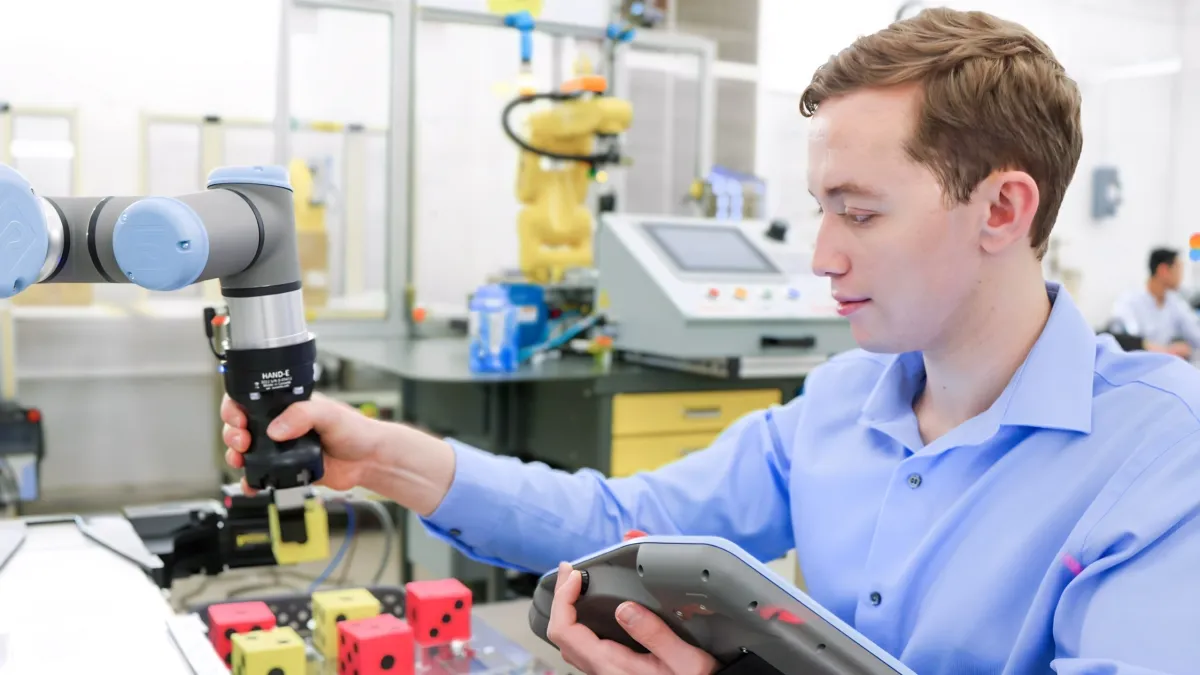ASU, University of Michigan launch manufacturing research center
NSF-funded center advances smart manufacturing and trains students in digital twin technology

A student operates a robotic arm using a handheld control interface to sort colored blocks as part of an advanced manufacturing and automation training exercise in the Industrial Automation and Robotic Systems Lab on ASU’s Polytechnic campus. ASU and the University of Michigan are collaborating on a new National Science Foundation Industry-University Cooperative Research Center dedicated to improving manufacturing technology. Photo by Sona Srinarayana/ASU
With funding from the National Science Foundation, Arizona State University is collaborating with the University of Michigan to establish the Center for Digital Twins in Manufacturing, aimed at advancing scalable digital twin technologies.
The new center will address the key barriers that are delaying the broader industry implementation of digital twins.
A digital twin is like a real-time dashboard. Just as pilots use flight simulators, engineers rely on digital twins to monitor, analyze and improve performance without disrupting an actual system.
These tools offer powerful capabilities for boosting efficiency and precision in manufacturing, but widespread adoption has been slowed by challenges in updating, scaling and integrating across platforms.
To maximize their full potential, digital twins must become more adaptable across complex manufacturing systems.
The center will operate as an NSF Industry-University Cooperative Research Center, which unites academic institutions and industry partners on research that has direct industry relevance.
Wenlong Zhang, an associate professor of manufacturing engineering in the School of Manufacturing Systems and Networks, part of the Ira A. Fulton Schools of Engineering at ASU, is a principal investigator and co-director of the new center.
“The ability to automatically update a factory’s digital twin every time a machine part wears down, a robot is reprogrammed or a process is optimized is essential,” Zhang says.
From theory to test bed
The center will build frameworks and tools to make digital twins more adaptable and sustainable over time. Research areas include machine learning, multiphysics simulation, stochastic modeling, human-robot systems, industrial Internet of Things and supply chain management.
“This consortium of industry collaborators, aligned around a shared focus, helps ensure academic innovation stays connected to real-world manufacturing challenges,” says team member Binil Starly, director of the School of Manufacturing Systems and Networks and a professor of manufacturing engineering in the Fulton Schools. “It addresses common technical issues, accelerates deployment, reduces risk and drives long-term value across the sector.”
With the grand opening of Interdisciplinary Science and Technology Building 12, or ISTB12, on the ASU Polytechnic campus this fall, the center will have a flexible space for developing smart manufacturing test beds in collaboration with industry partners. These test beds integrate robotics, sensors, controllers and production platforms to create a connected environment for simulating, testing and refining digital twin tools before deployment.
“These labs allow industry partners to see concepts in action and explore how new digital twin tools might apply to their own operations,” Zhang says.
The center will tackle urgent industry challenges such as modernizing legacy systems, optimizing processes with digital twins, enabling flexible robotic manufacturing and advancing predictive maintenance. A key goal is to prepare students with the technical skills and applied experience needed for future roles in manufacturing.
Connecting local industry and research
ASU’s involvement in the center reflects Arizona’s growing role in advanced manufacturing, driven by major investments in aerospace, microelectronics and energy systems.
“We’re fortunate to be located in a region that is actively building the future of manufacturing,” Zhang says. “It allows us to collaborate closely with industry and help shape innovations that can be deployed right here in Arizona.”
The center is currently in discussions with several Arizona-based companies interested in joining the research consortium. While no formal announcements have been made, industry engagement is a key part of the center’s strategy.
“We’re having proactive conversations with organizations who see digital twins not just as a tool but as a means to increase efficiency, quality and agility,” Zhang says.
Consortium members gain access to collaborative research, early insights into new technologies and a direct pipeline to student talent trained in digital manufacturing. One of the key benefits is the ability to leverage each member’s investment, which helps reduce the overall cost and risk of research and development.
The official launch of the center is scheduled for Oct. 9–10, and the first round of projects will begin in January.
The center will serve as a starting point for national progress in digital manufacturing, helping the U.S. remain competitive in an evolving global economy.
In addition to advanced research, the center will support the development of new curriculum modules and certificate programs in digital twin applications. These additions will enhance ASU’s degree programs in robotics, systems engineering and smart manufacturing.
Zhang believes the center’s collaborative model will create long-term value for both students and industry members.
“We provide industry with a sandbox to explore digital twin implementations without interrupting their actual operations,” he says. “Working together creates a win-win situation.”
